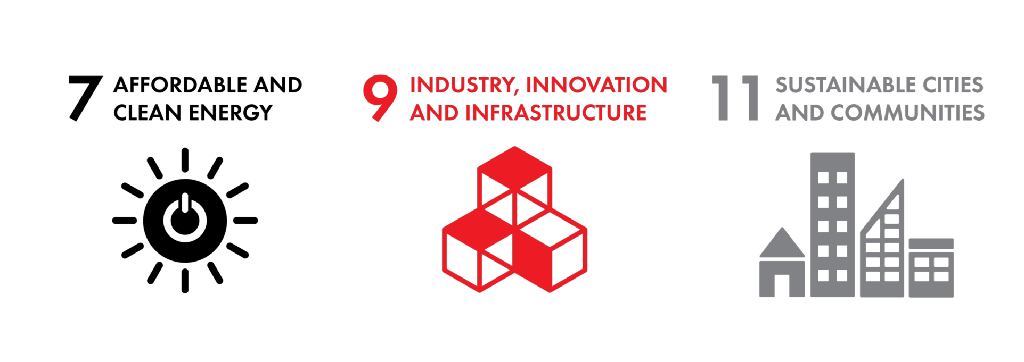SDGs
As one of Europe’s leading parking service providers, Q-Park wants to demonstrate its contribution to the UN Sustainable Development Goals (SDGs).
Although Q-Park’s business potentially has an impact on all 17 SDGs, we have identified three that align most with our business, strategy and objectives and where we believe we can make a difference. These are SDG 7 (Affordable, reliable, sustainable and modern energy), SDG 9 (Industry, innovation and infrastructure) and SDG 11 (Sustainable cities and communities).
Figure 15 Q-Park focuses on three SDGs: 7, 9 and 11

Why are these SDGs significant to Q-Park?
With an increasing world population, greater numbers of people living in urban areas, and rising prosperity, urban infrastructure is becoming significantly more important.
One of the accompanying challenges for municipalities is to maintain a liveable city as they contend with a range of issues: congestion, search traffic cruising for a place to park, reduced accessibility, air pollution, as well as unattractive and unsafe streets and squares full of parked cars.
We have aligned our CSR strategy with the SDGs and identified the relevant sub-targets. The following table shows the relationship between the SDGs that are the most relevant for Q-Park and the company’s contribution.
SDG | Description Sustainable Development Goal | Q-Park’s activities and contribution |
7 | Affordable, reliable, sustainable and modern energy | |
7.2 | By 2030, increase substantially the share of renewable energy in the global energy mix. |
|
7.3 | By 2030, double the global rate of improvement in energy efficiency. |
|
9 | Industry, innovation and infrastructure | |
9.1 | Develop quality, reliable, sustainable and resilient infrastructure, to support economic development and human well-being, with a focus on affordable and equitable access for all. |
|
9.4 | By 2030, upgrade infrastructure and retrofit industries to make them sustainable, with increased resource-use efficiency and greater adoption of clean and environmentally sound technologies and industrial processes, with all countries taking action in accordance with their respective capabilities. |
|
11 | Sustainable cities and communities | |
11.3 | By 2030, enhance inclusive and sustainable urbanisation and capacity for participatory, integrated and sustainable human settlement planning and management in all countries. |
|
11.6 | By 2030, reduce the adverse per capita environmental impact of cities, including by paying special attention to air quality and municipal and other waste management. |
|
11.7 | By 2030, provide universal access to safe, inclusive and accessible, green and public spaces, in particular for women and children, older persons and persons with disabilities. |
|
11.A | Support positive economic, social and environmental links between urban, peri-urban and rural areas by strengthening national and regional development. |
|
